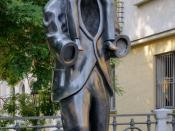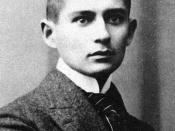Kafka highlights the modernist tension through the allegory of ÃÂthe lawÃÂ. Just like the man in the story, we all seek this law in order to further our understanding of our human existence. Before the Law is a narrative of human life; throughout our life we seek purpose and order, and answers to our existence yet we are obstructed from this by own minds, which in this short extract, is represented by the Gatekeeper. We seek a reason, a Law if you will, that will aid us, and thus we seek it, but discover our path is obscured by ourselves and the inaccessibility of the law.
According to KafkaÃÂs writing, the law is not a desirable institution that one can turn to for protection of their rights. ÃÂBefore the LawÃÂ demonstrates a lack of timeliness in the justice system when the man grows old waiting to be permitted to entire it.
Boris Suchkov states that, ÃÂthe man has come to know and find justice and is left with nothing, and the law, for which he has thirsted is inaccessible to him...but at no time during the parable does the guard actually say that the man cannot enterÃÂ. WE MUST NOTE THAT, the doorkeeper stands before the law and not IN the law. The doorkeeper may be a hyperbole of the strength of world evil.
ÃÂFrom hall to hall there is one door-keeper after another, each more powerful than the lastÃÂ. This quote may refer to KafkaÃÂs search for truth; each successive guard representing a layer, more obscured/powerful and impenetrable than the last, of the inner self that one must come in contact and bypass during a search for true identity.
ÃÂNo one else could ever be admitted here, since this gate was made only for you.


